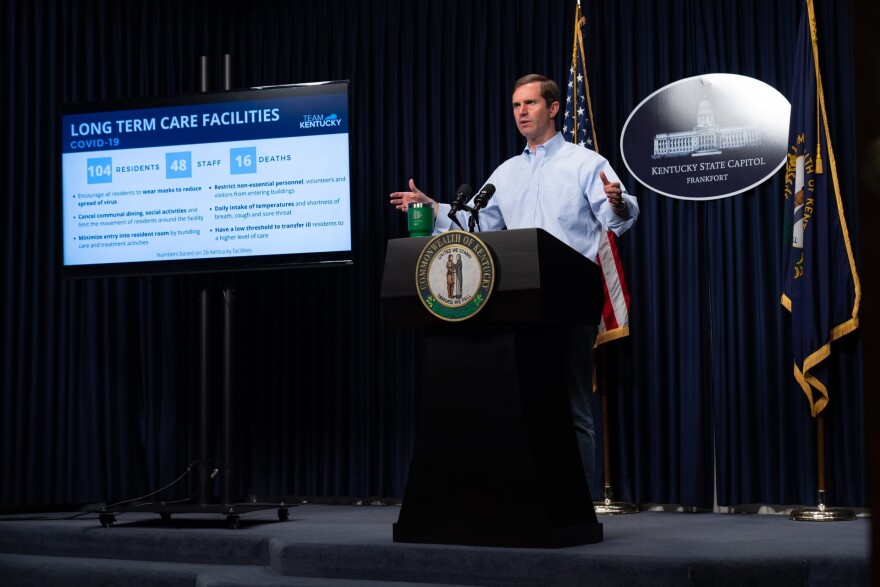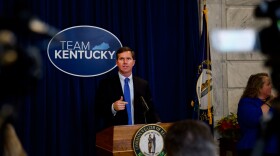Kentucky Governor Andy Beshear’s schedule to restart the economy appears to contradict his administration’s own benchmarks for when it is safe to reopen.
Just 10 days ago, Beshear said it would not be enough to flatten the curve before reopening. Following guidance from the White House, Beshear said Kentucky would need to see 14 days of declining cases before making any announcements.
“If we are there, that’s great, but remember what the White House has said and what we know, is we actually need two weeks of going down,” he said.
On Wednesday, Beshear announced a phased reopening of the Commonwealth while acknowledging confirmed cases of coronavirus have "plateaued," but not yet declined.
He’s already released guidelines for reopening the health care sector and has staggered further openings over the next month with plans to open manufacturing and construction on May 11, retail and houses of worship on May 20 and barbershops and salons by May 25.
On Thursday, Beshear said "the answer is maybe" about whether the state will see a 14-day decline ahead of the May 11th opening opening.
"I believe that we will see that we are on the decrease in May, again the numbers have to bear that out," Beshear said.
Ahead of reopening, public health experts around the country say communities need to ramp up testing and contact tracing to identify, track down and isolate people who have been infected with the coronavirus before they spread it to others.
The Beshear administration included these standards among seven benchmarks to meet ahead of reopening the economy, but so far it does not appear the state has met necessary thresholds for declining cases, testing or contact tracing.
Kentucky continues to have among the lowest rates of testing in the country, according to John Hopkins University.
At the same time, Kentucky’s daily rate of testing sits at 61 per 100,000 residents, which is below the White House guidance of 100 tests per 100,000, according to the Courier Journal.
Meanwhile, an NPR report from Tuesday estimates Kentucky has about half of the staff necessary to meet the estimated need for contact tracing in the state. On Thursday, Beshear said the state is hiring more than 700 workers to conduct contact tracing.
"We believe we will have that workforce together in time," he said.
Testing and contact tracing are critical to understanding the curve of the pandemic, said Dr. Gonzalo Bearman, Chief of infectious diseases at Virginia Commonwealth University.
Testing is important on an individual level for understanding who has the virus, but’s it’s also important on a population level for tracking the spread of the virus, Bearman said.
Once you’ve identified a patient, contact tracing becomes important to find those who may be potentially infected, and isolate them before they can transmit it to others, he said.
Projections from the University of Washington highlight that cases have not yet begun to decline. In fact, the university's forecast recommends that Kentucky wait until the middle of June before relaxing social distancing guidelines.
Moving forward with reopening the economy before rates decline increases that chance for a second spike in community transmissions, Bearman said.
“The risk is that you have a rebound or an increase in the number of cases,” Bearman said.
A University of Kentucky study released earlier this week found the state’s measures have so far significantly reduced the number of coronavirus cases. It found confirmed cases would be about 10 times higher in the state without government-imposed social distancing restrictions.
The study’s lead author, Charles Courtemanche, is a health economist at the University of Kentucky who studies the impacts of government programs and policies. Economics, he says, is all about trade offs, and the state is weighing public health against the long-term health of the economy.
“If he was looking at this purely through a public health perspective and nothing else, we would say maybe wait a little longer, but that’s not real life. You do have to weigh these tradeoffs,” Courtemanche said.
Courtemanche said it’s likely that the state has decided to move forward with a staggered re-opening because Beshear's administration has looked at the trends and predicted the state will meet the necessary benchmarks in the coming weeks.
“Certainly there is politics involved, and I’m not going to speculate on exactly how much of it is that, but certainly he is aware of the protests and push-back and I imagine that’s moved his calculus a little bit. But that said, I don’t think it’s all politics,” Courtemanche said.
This story has been updated.







